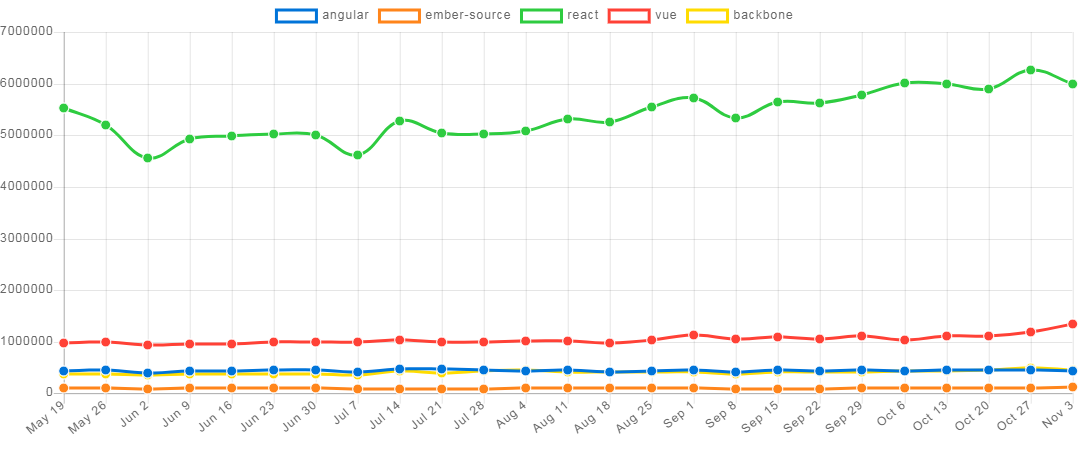There are loads of JavaScript frameworks already in the market and still, there is no dearth of new ones that are jointing the league of Javascript frameworks. While some are enjoying outstanding popularity and acceptance among the developer community, there are several others that enjoy popularity among niche frontend app developers. Just because there are too many choices, you are likely to find making choices difficult. Considering this, here we are going to shortlist the top Javascript frameworks for frontend development.

Angular
Angular is probably the only Javascript framework that evolved for so long a time and went through so many phases of improvements. In the coming year, we are going to have Angular 9, the upcoming update of the framework. The new Angular 9 is likely to make the Ivy compiler usable for all apps. The principal benefit of this framework is that it can reduce the app size to a great extent.
Angular in recent years has become very popular for frontend development thanks to the modularity and adaptability. Angular being always a highly flexible framework slowly became an ideal framework for front-end development projects. From Angular 2 and successive versions, developers could get the Model View Controller (MVC) architecture which further gave Angular a positive push.
Some of the key components of Angular include the following.
- For using zones within Angular apps, the developers have access to the Zone.js JavaScript library.
- AngularJS boasts of both TypeScript and CoffeeScript languages for programming.
- Angular bets on RxJS and the Observable pattern for all server-side communication.
- For debugging purposes, Angular uses the Augury library.
- For building server-side apps Angular uses Angular Universal.
- Starting from Angular2, the Angular developers have access to all modern tools they need for development.
React
React is another leading Javascript framework that was created and maintained by Facebook. As a leading Javascript framework, it is now way ahead of other frameworks in terms of a number of projects it is used for.
The biggest strength of React is its reusability of the code and modular development approach. Thanks to the ease of building components that can be utilized across multiple platforms or app versions, this has become tremendously popular for cross-platform development projects across the niches.
React is basically a robust library that comes loaded with an array of user interface design elements and tools. It is just the ideal framework for building impressive single-page web applications and cross-platform applications. Some of the key strengths of React include extremely low footprint file size, flexibility, compatibility with multiple libraries and simple maintenance.
The popularity and strength of React is easily comprehended by the range of applications across the niches built using React. Some of the leading apps all over the globe that uses React include the likes of Whatsapp, Netflix, New York Times, Airbnb and several others.
Vue.js
Developed and launched not so long ago, VueJS quickly became one of the most popular and highly acclaimed Javascript frameworks for frontend development purposes. Starting its journey from 2014, VueJS is presently giving a tough competition to other leading Javascript frameworks.
Though the core concept of Vue has many common attributes of both Angular and React, VueJS according to many developers is actually a better framework in terms of efficiency and development ease. Another crucial aspect that developers often refer to is the frontend security ensured by VueJS.
Much in the same way like Angular Vue is created to mix HTML attributes with the JavaScript and thus to make development more lucid and fast-paced. Vue allows developers to accommodate both the store component logic and the style sheet in just one file. This just as in React, allows components to communicate with each other. This is how Vue comprises of best of both Angular and React frameworks. Vue is more easy to use, lightweight and more adaptable.
Node.js
Node.js is another leading cross-platform Javascript framework that will continue to stay in the limelight in the years to come. Coming as a fully equipped Javascript runtime environment with a multitude of benefits, NodeJS is all set to remain as a mainstay tool for Javascript development in 2023 and beyond.
Some of the key advantages of NodeJS that made developers flock to this framework for their frontend development needs include easy development practices, robust scalability, full-stack development tools and libraries, Google V8 engine for boosting performance, robust community support, etc.
With so much to offer, NodeJS is likely to become a popular choice among developers for large projects. This is why NodeJS has been given a preference for a multitude of leading app projects that include names such as LinkedIn, Netflix, IBM, Groupon, SAP, Yahoo, Microsoft, and several others.
Backbone.js
Backbone JS is another widely popular Javascript framework that is going to stay at the focus among Javascript developers. Based on the MVC architecture this framework works great in implementing the component logic in the same way as the controller. The framework also works great by using multiple engines such as Mustache and Underscore.js.
A key strength of the Backbone JS framework is its ease of use and simplicity. This is why it is often preferred by the frontend developers for building single-page applications at a quick time. You can also use the framework along with some sophisticated tools and gain the best of the framework for your project. Some of the key tools available for the BackboneJS developers include Marionette, Chaplin, Handlebars, Thorax, or Mustache, and several others.
Conclusion
When it comes to Frontend development using Javascript frameworks, the choice is really enormous and expansive to choose from. But given the importance of factors such as flexibility, ease of use, robust set of tools, performance, design elements and reusability of the code, the above-mentioned frameworks have a clear edge over the others.







